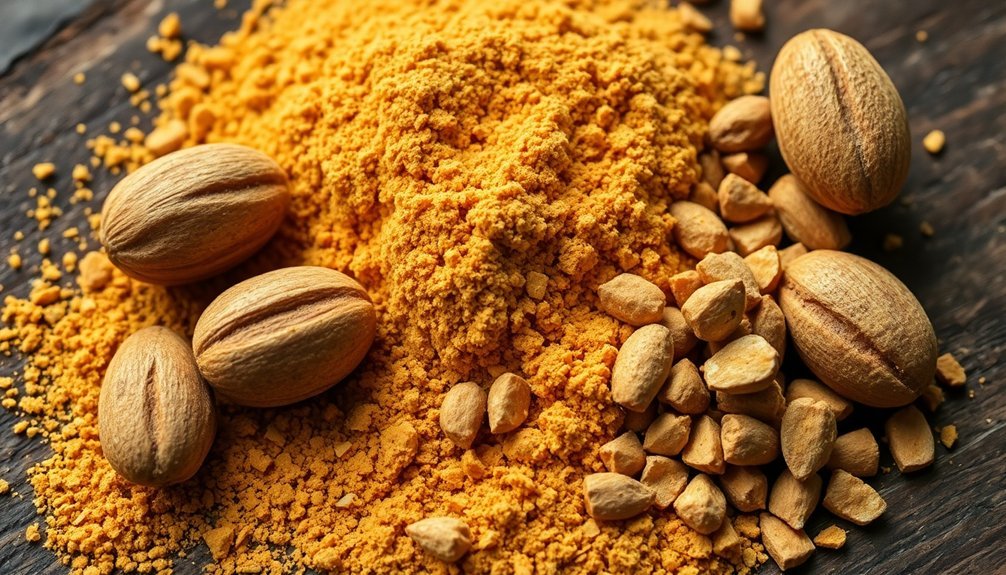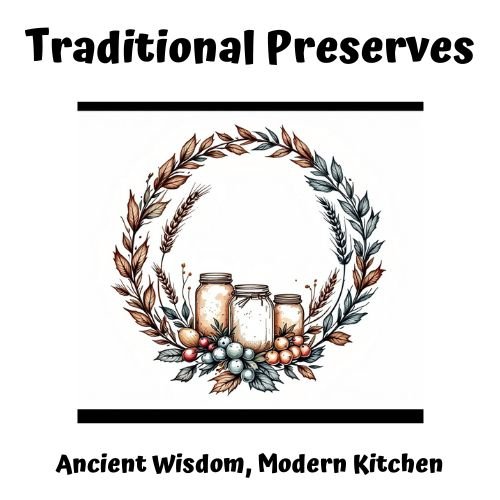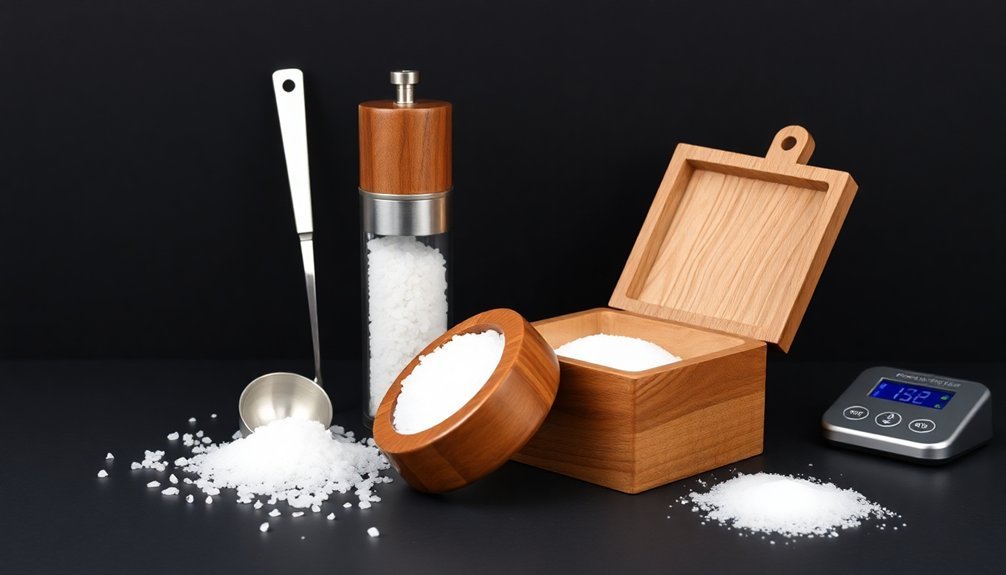Nutmeg's powerful essential oils protect your food through a dual-action approach against spoilage. When you use nutmeg, its key compounds – sabinene, terpineol, and myristicin – attack harmful bacteria by disrupting their cell membranes, causing them to leak and die. These compounds make up 61-88% of nutmeg's volatile oils, creating a natural preservation shield that's been trusted for over 3,500 years. You'll also benefit from nutmeg's rich antioxidants, which fight food-damaging free radicals while its monoterpenes provide anti-inflammatory protection. The science behind this ancient spice's food-saving power reveals an fascinating story of nature's intelligence at work.
The Ancient Power of Nutmeg

How long has humanity known about nutmeg's remarkable properties? The historical records show you can trace nutmeg's documented use back to ancient Indian texts from 1500-1000 BCE. In the Vedas and Charaka Saṃhita, you'll find detailed accounts of how people used this spice for everything from digestive issues to breathing problems.
Islamic scholars in the 9th and 10th centuries made significant advancements in understanding nutmeg's medical applications. You can see nutmeg's influence spread through the Middle East, where Arab cultures pioneered its use in food preparation. They weren't just adding it for flavor – they recognized its powerful medicinal properties, as documented in Ibn Sina's "The Canon of Medicine." The spice's reputation for fighting spoilage made it particularly valuable.
When you look at European history, you'll discover that nutmeg played a significant role in food preservation. From Pliny the Elder's first-century descriptions to its widespread use in medieval Europe, people relied on nutmeg to keep their food fresh and mask the smell of spoiling meat.
You can find evidence of this in everything from Elizabethan records to Emperor Henry VI's use of nutmeg to purify Rome's streets, demonstrating its long-recognized antimicrobial properties.
Chemical Secrets Inside Nutmeg
Those remarkable antimicrobial properties that made nutmeg so valuable throughout history stem from its complex chemical makeup.
When you examine nutmeg's essential oil, you'll find it's packed with potent compounds that naturally fight harmful bacteria. The oil makes up 5-15% of the nutmeg kernel and contains a precise blend of monoterpenes and phenylpropanoids that work together to combat food spoilage. The insoluble in water essential oil requires proper storage conditions for maximum effectiveness.
Here's what makes nutmeg such an effective bacteria fighter:
- Sabinene (28.13%) and 4-Terpineol (22.02%) form the backbone of nutmeg's antimicrobial action
- Myristicin (13.95%) contributes to both preservation and brain-stimulating properties
- Alpha-pinene (11.45%) adds to the oil's bacteria-fighting capability
- Monoterpene hydrocarbons make up 61-88% of the volatile oil components
- Essential oils work through a disc diffusion method to inhibit bacterial growth
These compounds are particularly effective against common food-spoiling bacteria like E. coli, S. aureus, and P. aeruginosa.
Through gas chromatography analysis, scientists have identified 27-38 different chemical constituents in nutmeg oil, each playing a role in its preservation properties.
Battling Harmful Food Bacteria

When bacteria threaten to spoil your food, nutmeg's powerful essential oils step in as a natural defender. You'll find it particularly effective against common food-spoiling bacteria like E. coli, Staphylococcus aureus, and Pseudomonas aeruginosa, which can make you seriously ill if they contaminate your meals. According to studies from the 1st International Conference, nutmeg has shown remarkable effectiveness in sustainable food preservation practices.
What makes nutmeg so effective is its multi-pronged attack on harmful bacteria. It disrupts their cell membranes, stops DNA synthesis, and reduces their energy supply by depleting ATP. You can actually see this damage under a microscope, where bacterial cells show clear signs of deterioration after exposure to nutmeg oil.
You'll get the best results when using nutmeg in food preservation at specific concentrations. The minimum amount needed to inhibit bacterial growth is 0.05%, while 0.1% will kill the bacteria completely.
It's particularly useful in meat preservation, especially pork products, where it helps maintain both safety and flavor. Thanks to active compounds like sabinene, 4-terpineol, and myristicin, you can count on nutmeg as a natural alternative to synthetic preservatives, keeping your food safer for longer without artificial additives.
Cell Membrane Destruction Process
The powerful components in nutmeg oil launch a devastating attack on bacterial cell membranes, causing them to break down and collapse.
When you examine this process under powerful microscopes, you'll see how nutmeg oil's active compounds, including γ-terpinene and myristicin, systematically destroy the bacteria's protective outer layer.
The destruction process follows a precise sequence that you can observe through specialized equipment:
- The oil first attaches to the bacterial membrane, creating weak points in the cell's structure
- These weak points develop into larger breaches, allowing crucial cellular components to leak out
- The bacteria's ATP (energy source) depletes rapidly, with up to 98.76% reduction
- DNA and other nucleic acids begin escaping through the damaged membrane
- The cell structure ultimately collapses, leading to bacterial death
You can actually track this destruction by measuring the leakage of cellular materials that absorb UV light at 260 nm.
As the concentration of nutmeg oil increases, you'll notice more severe damage to the bacteria.
This process is particularly effective because it's irreversible – once the cell membrane is compromised, there's no recovery path for the bacteria.
Natural Food Safety Shield

You'll find that nutmeg oil's powerful cell membrane attack strategy works by disrupting bacterial membranes through its major components like sabinene, alpha-pinene, and myristicin.
As a natural food safety shield, this essential oil's synergistic compounds create an effective antioxidant defense system that protects your food from harmful bacteria like E. coli and S. aureus.
These natural compounds don't just destroy existing bacteria – they'll continue working to prevent new bacterial growth, making nutmeg oil an excellent choice for food preservation with a minimum inhibitory concentration of just 0.05%.
Cell Membrane Attack Strategy
Through its powerful membrane-disrupting properties, nutmeg oil launches a strategic assault on bacterial cell walls, making it a formidable natural food preservative. When you look at how nutmeg oil works, you'll find it's particularly effective against Gram-negative bacteria, targeting their cellular integrity with remarkable precision.
The assault on bacterial cells is thorough and devastating:
- Disrupts the cell membrane's structure, causing irreversible damage
- Forces ATP and nucleic acid to leak from bacterial cells
- Reduces intracellular ATP content by 91.95% at minimum inhibitory concentration
- Achieves nearly complete elimination (99.999%) of L. monocytogenes within 16 hours
- Creates extensive cellular disintegration visible under electron microscopy
You'll see nutmeg oil's effectiveness most clearly in its time-kill analysis results. It doesn't just slow bacterial growth – it actively destroys harmful microorganisms through a bactericidal mechanism.
When encapsulated in liposomes, the oil's antibacterial properties become even more potent, offering extended protection against food spoilage. This encapsulation strategy, with its ideal Zeta potential of -49.2 mV, guarantees a controlled release that maintains the oil's effectiveness over longer periods, making it an excellent choice for natural food preservation.
Powerful Antioxidant Defense System
Building upon nutmeg's cell membrane attack strategy, its powerful antioxidant defense system adds another layer of food preservation capabilities.
You'll find an impressive array of antioxidants in nutmeg, including phenolic compounds, essential oils, and plant pigments like cyanidins, all working together to neutralize harmful free radicals that can cause food spoilage.
When you use nutmeg in food preservation, its protocatechuic, ferulic, and caffeic acids create a protective shield against oxidative stress.
These compounds don't work alone – they're supported by monoterpenes such as sabinene, terpineol, and pinene, which provide additional anti-inflammatory protection.
The combination of these bioactive components creates a robust defense system that helps prevent bacterial growth and food deterioration.
What makes nutmeg particularly effective is how its antioxidant properties work in sync with its antibacterial activities.
You'll see this demonstrated in how nutmeg's phenylpropanoids and phenolic aldehydes simultaneously fight bacteria while preventing oxidative damage.
This dual-action approach helps protect your food through both direct bacterial inhibition and by creating an environment where harmful bacteria struggle to thrive.
Modern Research Validates Traditional Use
For centuries, traditional healers have used nutmeg as a natural preservative and antimicrobial agent – and modern science now backs up their wisdom.
Recent research has validated nutmeg's powerful antibacterial properties through rigorous laboratory testing and clinical studies. You'll find that nutmeg's essential oils, particularly myristicin and sabinene, can effectively combat various harmful bacteria that cause food spoilage.
Modern studies have identified several ways that nutmeg fights bacteria:
- Its essential oils disrupt bacterial cell membranes, leading to their destruction
- The compound myristicin specifically targets E. coli and S. aureus
- Monoterpenes like sabinene and pinene provide broad-spectrum antimicrobial effects
- Phenylpropanoids and sesquiterpenes enhance its bacterial-fighting capabilities
- Multiple phytochemicals work together to create a powerful antimicrobial defense
Research presented at the 7th International Conference on Basic Sciences 2021 confirms nutmeg oil's significant antibacterial activity.
Test-tube studies and in vitro experiments demonstrate that while nutmeg may not be as potent as synthetic preservatives, it offers a natural alternative for food preservation, supporting what traditional healers have known for generations.
Frequently Asked Questions
Can Consuming Too Much Nutmeg Oil Be Harmful to Human Health?
Yes, you'll experience serious health risks if you consume too much nutmeg oil. It can cause nausea, hallucinations, blackouts, and cardiovascular problems. Even small overdoses may require immediate medical attention.
How Long Does Nutmeg's Antibacterial Effect Last in Preserved Foods?
You'll find nutmeg's antibacterial effects last throughout food storage when refrigerated, though duration varies. If you're using encapsulated forms, you'll get better stability and longer-lasting protection against bacterial growth.
Does Cooking With Nutmeg Reduce Its Bacteria-Fighting Properties?
Yes, high-heat cooking can reduce nutmeg's antibacterial effects by degrading its active compounds. You'll maintain more bacteria-fighting properties by adding nutmeg near the end of cooking or using gentle heat.
What's the Difference Between Ground Nutmeg and Nutmeg Oil Effectiveness?
You'll find nutmeg oil is considerably more potent than ground nutmeg at fighting bacteria. It's concentrated with stronger antimicrobial compounds, while ground nutmeg offers milder effects and is mainly used for flavoring.
Can Bacteria Develop Resistance to Nutmeg's Antimicrobial Properties Over Time?
While it's possible, you'll find bacteria are less likely to develop resistance to nutmeg since it contains multiple active compounds. Unlike single-compound antibiotics, nutmeg's diverse antimicrobial components work together against bacterial adaptation.
In Summary
You've discovered how nutmeg's natural compounds work as powerful antimicrobial agents. Its essential oils, particularly myristicin and eugenol, disrupt bacterial cell membranes and prevent harmful microbes from growing in your food. Whether you're adding it to preserves or cooking traditional dishes, you're tapping into centuries-old wisdom that modern science now confirms. Keep this aromatic spice in mind as a natural food preservative.





Leave a Reply